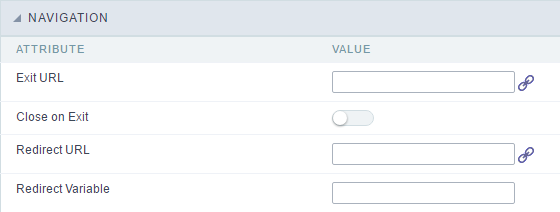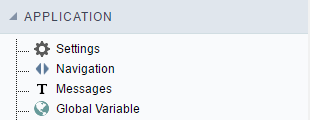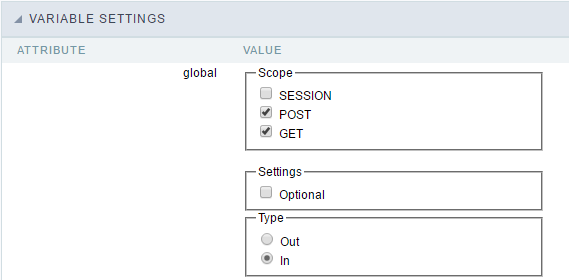Application Settings (Procedure)
Settings
Navigation
This interface allows defining the navigating behavior of the application
 Navigation Interface.
Navigation Interface.
Exit URL
URL to where the user goes when he clicks on the “exit” button.
Close on Exit
Close the browser window when the user clicks on the “exit” button.
Redirect URL
Redirect to another URL in case there aren’t any global variables available.
Redirect Variable
Creates a variable with the application name and sends it to the redirected application.
Global Variables
This screen shows all global variables used in the application
The global variable is an external parameter required for running the application. The application can include global variables in the WHERE clause, field definitions and names, event programming, and so on.
You can define global variables by using square brackets ([variable]). You can pass the parameters to the application through one of the methods: Session, Post, and Get
IMPORTANT: if you need to use Database Identifiers in your tables, we recommend using the double quotation marks( “ ) instead of the brackets( [ ] ) because of the conflict with the of Global Variables syntax{:target=”_blank”} Scriptcase. Using the brackets as database identifiers may lead to problems in the Scriptcase applications.
 Global variables Interface.
Global variables Interface.
Example:
Select CustomerID, CustomerName from Customers
WHERE CustomerID = '[v_customerid]'
We do not recommend using session variables (global variables) with the same name as the table fields.
In this case, the variable v_customerid is displaying in the global variables configuration.
 Global variables configuration Interface.
Global variables configuration Interface.
Attribute
It shows the variable’s name in the application.
Value
Defines the behavior of the variables, divided into three blocks, they are:
Scope
Defines how the application receives the variable. A variable defined as the POST method in the app does not receive value if it comes with the GET method. Those are the methods available:
- Session: Defines that the variable must be created as a PHP session variable by another application.
- GET: Defines that the variable must be passed by the URL, that is, visible by the browser.
- POST: Defines that the variable must be passed through the POST method of an HTML form.
Settings
- Optional: Check it to don’t validate the variable at runtime.
Type (In / Out)
Defines whether the variable comes from another application (In), or it is starting in the current app (Out).
Description
Indicates where the application is using the variable.
